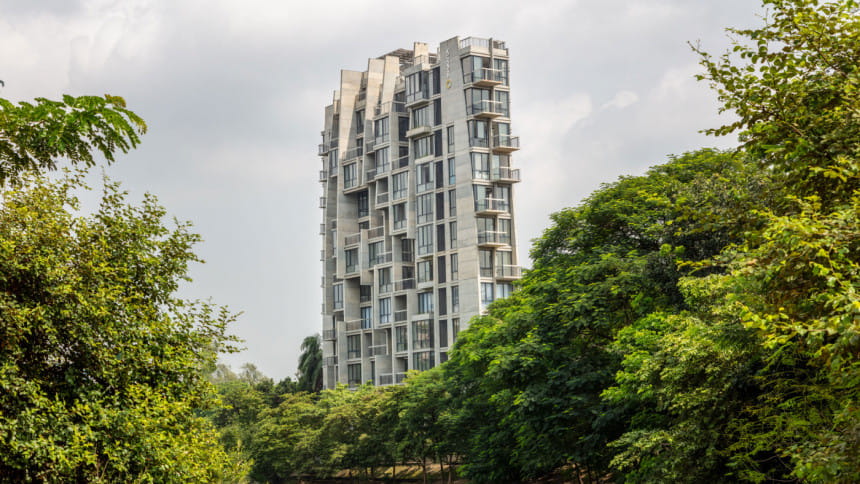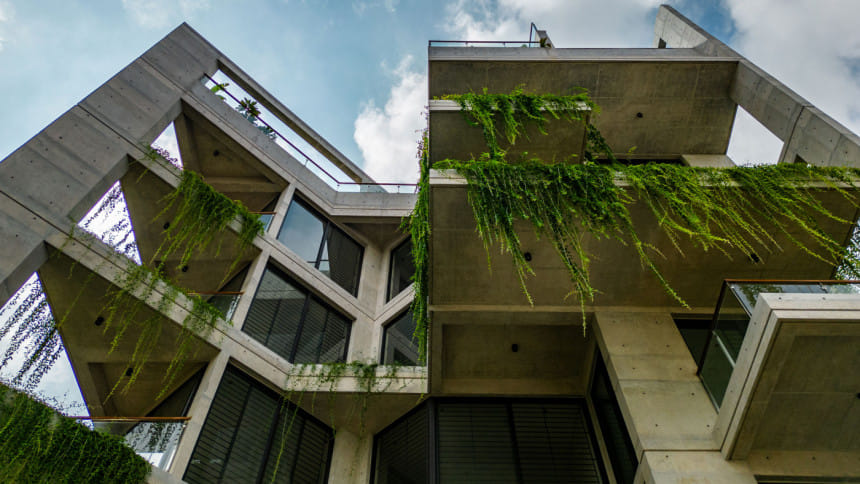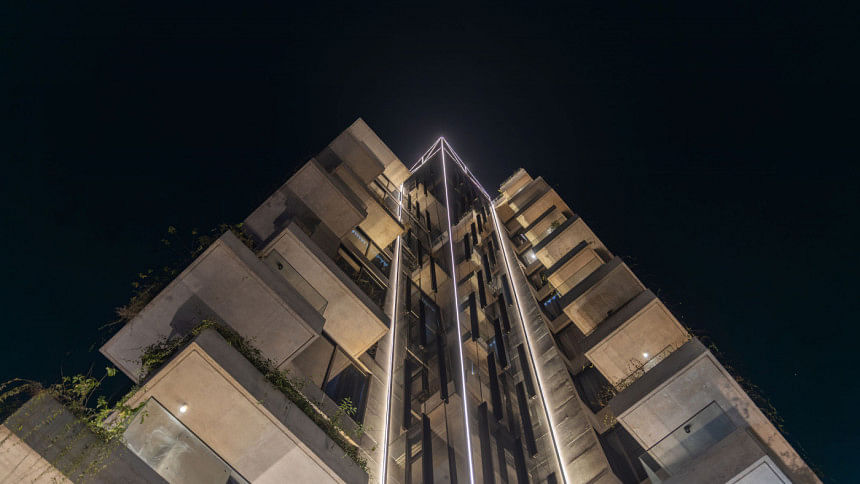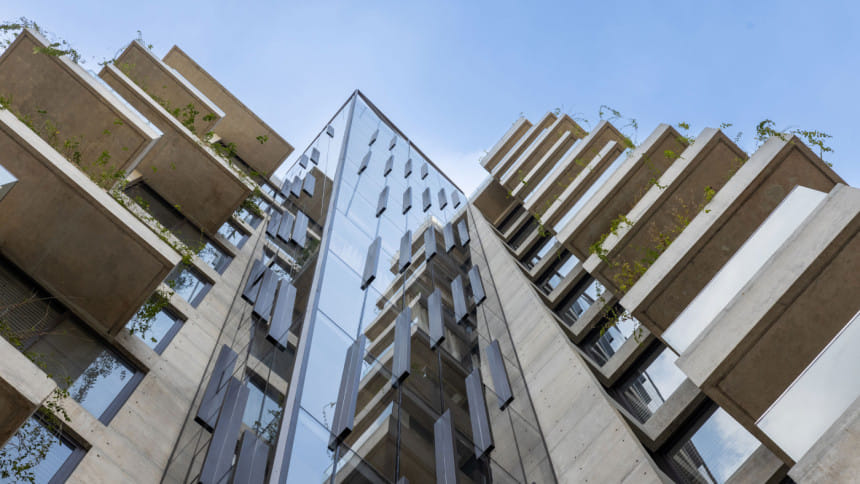Discovering the beauty of apartment exteriors

In the grand design of apartment living, the exterior is the invitation, while the interior is the warm embrace, welcoming you into a harmonious world. While interior design focuses on functionality, aesthetics, and comfort, pay attention to the crucial role of the exterior. Beyond just looks, they define curb appeal, safety, and environmental impact.
In the past, the exteriors of apartments in Bangladesh received little attention. Typically constructed using basic materials and simple methods, barely any consideration for aesthetic appeal or design came through. However, there are reasons why the exteriors of apartments have changed over time. With increased affordability, global exposure, and the internet, exteriors have taken a trendier path.
"In today's materialistic reality, globalization and consumer demands have introduced various construction materials, shifting from the earlier reliance on locally sourced products. This change in exterior practices reflects the changing demands of the times, involving materials such as modern glass, green and fair-faced buildings, and more," said Architect Ador Yousuf.

The new trends and elements
Fair faced apartments
Nowadays, we can commonly see fair-faced apartments – decorative concrete, mixed with aesthetic beauty in mind. It's often smoother and lighter than traditional concrete mixes ensuring that the natural beauty of concrete can shine through.
"It doesn't need veneers or paint and because of its smooth, uniform appearance, it stands on its own. As a result, these apartments give out a more contemporary look, also known as a sculpture-ish look," said an expert from RANGS Properties.
"However, fair-faced apartments are ones that we may not be able to see in all areas, except for the upstate as these buildings tend to be quite expensive," shared Moniruzzaman Talukder, Sr. Deputy General Manager, Sales, Navana Real Estate.
Going green
Among the several new aspects of exteriors, green buildings have become a popular practice. As Dhaka is a bustling concrete city with no horizontal space to plant enough trees, the practice of horizontal green plants in buildings is quite interesting because of the numerous benefits.
For instance, when visiting a RANGS construction site, you'll notice the striking yellow and green ferns or plants set vertically. These vertical greens aren't just for show as they're a mandatory addition to various panels on their building exteriors. Beyond their visual appeal, these green installations serve a practical purpose. By keeping the interior temperature lower, they reduce energy consumption, while also absorbing external noise pollution.

Modern glass
Various types of glass, including double-glazed, laminated, float, tempered, insulated, tinted, shatterproof, reflective, chromatic, and others, find application in both the exteriors and interiors of apartments. Their usage offers advantages such as heat and sound insulation. However, these benefits are only fully realized with top-quality glass.
"Glass is pivotal in architectural design, bridging indoor and outdoor spaces seamlessly. Performance double-glazed windows are now widely adopted, providing superior insulation and reducing heat transfer. In commercial construction, unitized curtain glass stands out, slashing structural loads and preserving aesthetics. Its lightweight nature not only speeds up construction but also aligns with sustainability goals," mentioned Engr. Rafiqul Islam Shuzon, Sr. General Manager, Planning and Coordination Department, Shanta Holdings Ltd.
Glass frames also come in various types, and architects devote significant attention to their selection when designing homes. Typically, imported glasses dominate in these constructions, with local products mainly reserved for window glasses according to Moniruzzaman Talukder, Sr. Deputy General Manager, Sales, Navana Real Estate.
Regarding this matter, Architect Ador Yousuf said, "While it's impressive that we've embraced Euro-centric building designs, it's crucial to acknowledge that our warm, humid climate in Bangladesh poses challenges. The tropical environment leads to significant heat gain, resulting in high energy consumption for electronics like AC in buildings. Therefore, if using glass in construction, it's essential to provide proper shading to avoid direct heat exposure. Additionally, precautions are necessary during heavy rain periods. Furthermore, glass buildings should occupy spacious areas to facilitate ample air and light circulation, ensuring better ventilation, cooler temperatures, and reduced reliance on artificial ventilation."

Traditional brick structures
Traditional brick structures remain a hallmark of our country's architecture for both interiors and exteriors, retaining popularity, particularly in buildings like schools, mosques, and residential buildings.
The Aga Khan School is a prime example of a red brick structure that exudes timeless appeal according to Moniruzzaman Talukder, Sr. Deputy General Manager, Sales, Navana Real Estate.
While seemingly traditional, these brick buildings boast a tactile terracotta texture and color, adding a distinctive charm to their aesthetic as per Architect Ador's words.
Tiles, granite, and marble
"Tiles, while less favored by prominent developers for aesthetic reasons, still find purpose in specific building requirements, often complementing materials like marble, granite, and glass. Strategically chosen, tiles effectively combat maintenance issues by repelling moisture and offering design versatility beyond traditional materials," said Engr. Rafiqul Islam Shuzon, Sr. General Manager, Planning and Coordination Department, Shanta Holdings Ltd.
As glass enhances spatial fluidity, the synergy of double-glazing glass and tiles showcases the industry's dedication to functional and sustainable architecture. Incorporating tiles in the apartment exterior also minimizes moss accumulation. Notably, the Oxford International School in Dhanmondi serves as a striking example of a tile-adorned exterior.
Wood
Wood often incurs higher costs compared to other materials due to the meticulous processing and care it demands. Its susceptibility to rot in harsh, humid, or rainy conditions necessitates careful consideration before implementation in building projects.
The decision to use wood hinges entirely on the apartment design and the feasibility of maintenance. While viable, wood hasn't gained widespread popularity in Bangladesh, particularly for exterior applications.
Hollow blocks
Hollow blocks are a prevalent choice for apartment exteriors, offering a blend of concrete durability and environmental friendliness. Their natural appearance resembles fair-faced buildings, eliminating the need for additional coloring.
The paints used
Among the array of options, weather coat paint stands out as a popular choice for the exteriors of apartments, offering robust protection against the elements. Its resistance to fading, even under intense sun or heavy rain, ensures lasting appeal and safeguarding.
Architect Ador mentioned while synthetic paints may find occasional use, a preference leans towards lighter hues for exteriors. This choice mitigates heat absorption, a consideration that emphasizes the practicality of light colors over darker counterparts.
Each element in the exterior landscape defines more than just aesthetics – it shapes safety, sustainability, and environmental impact. Yet, it's in the seamless integration of interior and exterior design where true magic unfolds, creating spaces that resonate with our lifestyles and values.
"In apartment design, the interior takes precedence as it forms the foundation upon which the exterior is built. Initial planning begins with the interior space, prioritizing factors like context, user needs, and size. Through a collaborative process, the design evolves, resulting in a dialogue that informs both the interior layout and the eventual exterior elevation. Effective coordination between interior and exterior design teams is essential for a cohesive and functional outcome," mentioned Ador Yousuf.

 For all latest news, follow The Daily Star's Google News channel.
For all latest news, follow The Daily Star's Google News channel. 



Comments